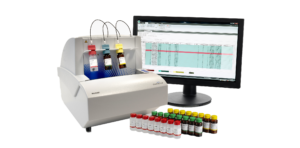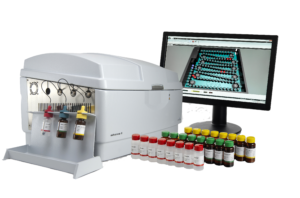Celsis® Rapid Microbiological Detection Systems use a patented technology to enhance the bioluminescence of ATP molecules, which allows testing of product sterility within 4-6 days and microbiological purity within 24 hours. The speed of results and reliability of Celsis® luminometers far exceed the capabilities of traditional methods.
The AMPiScreen® reagent technology provides faster turnaround times than its competitors and is capable of detecting ultra-low levels of microbial contamination by utilizing a series of enzymatic reactions to detect even the lowest concentrations of microbial ATP. AMPiScreen® delivers results up to 50% faster than standard ATP bioluminescence by significantly reducing the incubation period.
Celsis® systems are designed to meet the need for fast time-to-market. Timely notification of microbiological contamination allows you to quickly streamline laboratory processes and reduce financial costs.
To the series Celsis® rapid microbiological detection systems offers two models of luminometers: a compact system Celsis Accel®which provides a productivity of up to 30 analyzes per hour and is designed for laboratories with small volumes of product analysis, and the innovative Celsis Advance II®, is designed for large production capacities and allows for the analysis of up to 120 samples per hour.
| Celsis® Accelsystem | Celsis® Advance IIsystem | |
| Designed for | microbiological quality control laboratories of enterprises with medium and small production capacities | microbiological quality control laboratories of enterprises with large production capacities |
| Productivity | 30 samples per hour with the ability to combine multiple batches into one run | 120 samples per hour with the ability to combine multiple batches into one run |
| Dimensions | 33 cm x 37 cm x 52 cm (WxHxD) | 65.6 cm x 40.1 cm x 43.3 cm (WxHxD) |
| Weight | 24 kg | 28 kg |
| Electrical specifications | 100-240 V, 50/60 Hz | 100-240 V, 50/60 Hz |
| Article no. | 7460288 | 7456004 |
 |
 |
Validation of an alternative method for determining sterility of Celsis AMPiScreen®
Validation of a rapid microbiological detection method requires extensive planning, documentation, testing, validation, and validation of method data, which typically takes several months to several years. This is the reason why rapid microbiological detection is often an obstacle to the implementation of rapid microbiological detection in the pharmaceutical and biotechnology industries. In addition, a thorough understanding of microbiology, statistics, and regulatory requirements is required to validate a sterility method. While validation is crucial, it should not be a barrier to successful implementation and reaping the benefits of an alternative method.
To meet the requirements for effective and reliable validation of rapid microbiological detection, Celsis® has developed the Celsis® Complete sterility validation and reporting package, which includes an equivalence report in combination with methods for testing method stability and reliability, detection limit, and product specificity. The Celsis® Validation Package reduces the number of resource-intensive steps in the validation of an alternative method, reducing the total validation time to a few months.
| Celsis® Complete – Validation package for the Celsis® membrane filtration sterility method | VAL6000MF |
| Celsis® Advantage – Protocol for the Celsis® Sterility Determination Method by Membrane Filtration | VAL6100MF |
Charles River®.
provides a rapid implementation of an alternative method for determining sterility with a complete equivalence report of Celsis® Rapid Microbiological Detection, based on Celsis AMPiScreen® ATP Amplified Bioluminescence Technology, prior to membrane filtration sterility testing. The equivalence report reduces the validation time to 3-6 months by eliminating the need to confirm the equivalence of an alternative method and allowing the validation team to proceed immediately to the method validation parameters.
The report demonstrates the equivalence of the Celsis AMPiScreen® rapid microbiological detection method with a 6-day incubation to the classical sterility testing method with a 14-day incubation for qualitative screening of pharmaceutical products for microbial contamination in accordance with USP <71>, Ph. Eur 2.6.1 and JP 4.06.
| Celsis® equivalence report to the membrane filtration sterility test method | VAL4000EQ |





